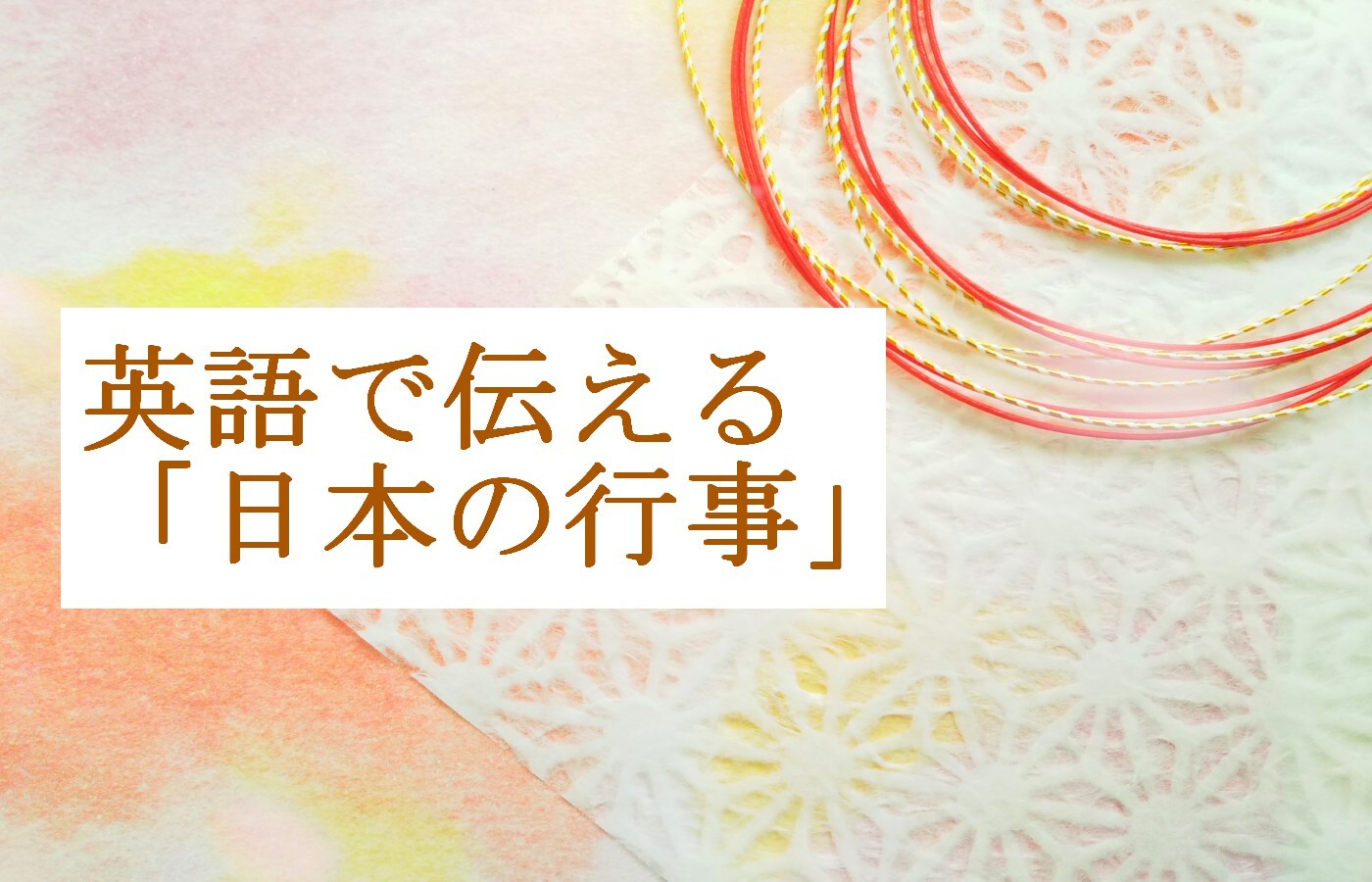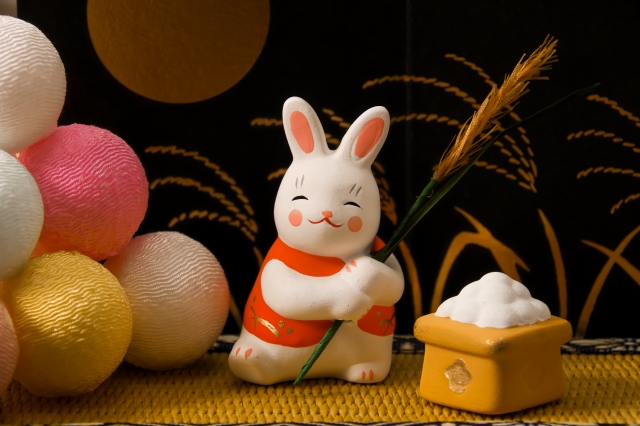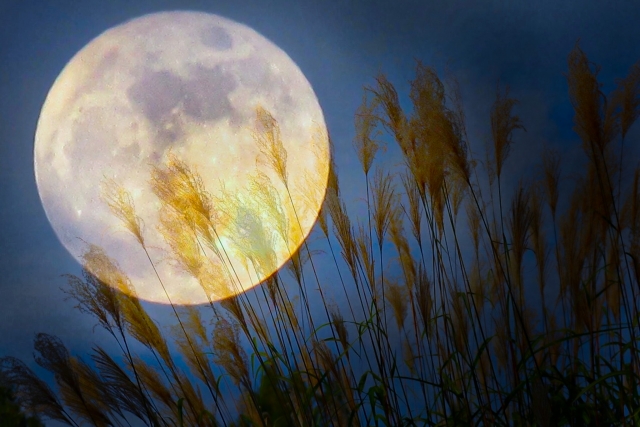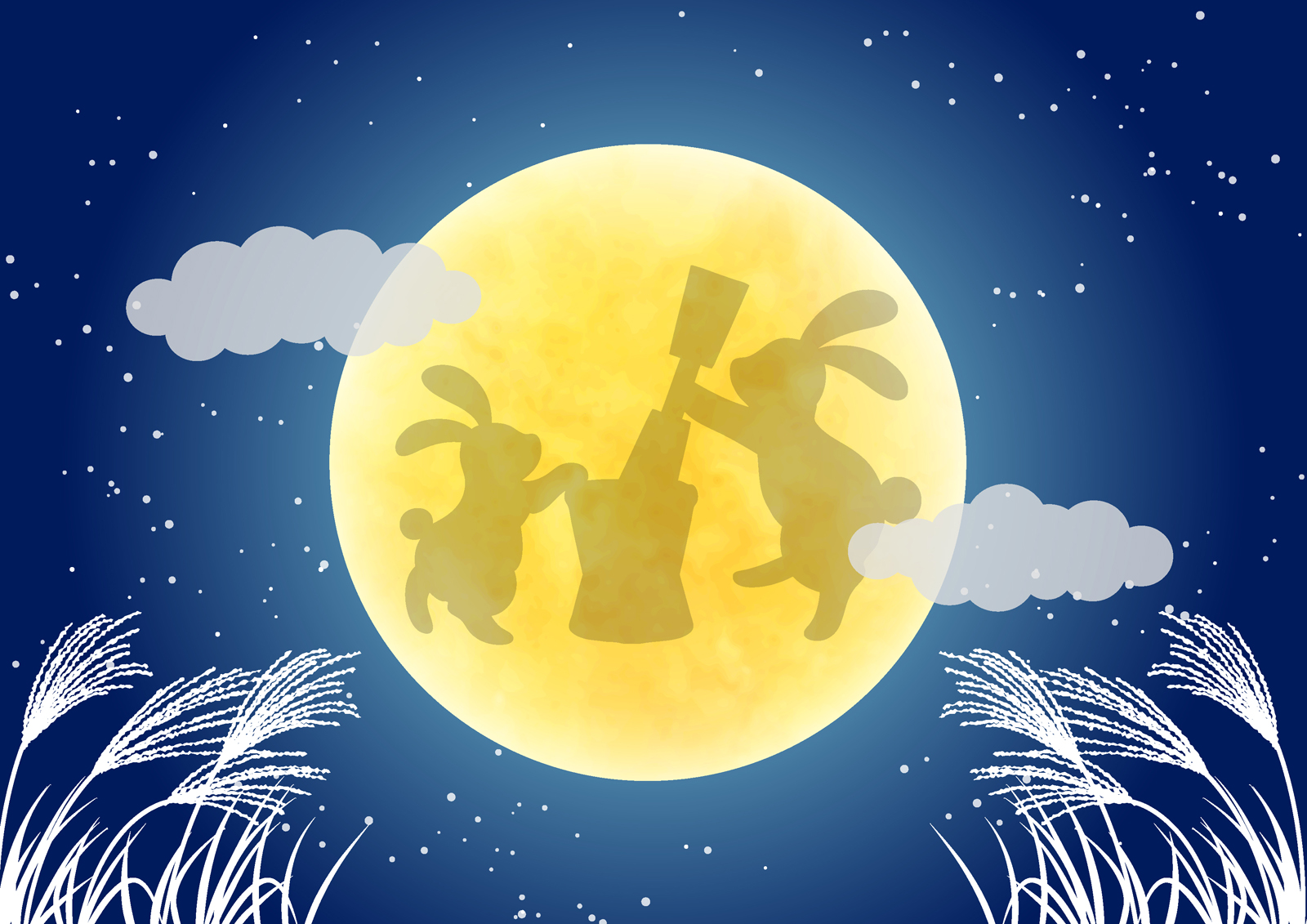英語で伝える「日本の行事」 9月 十五夜

日本人が慣れ親しんでいる四季折々の行事や風習は、外国の人々にとってはユニークで興味深いものがたくさん。
でも日本ならではのことを英語で伝えるのって難しいですよね。
この「英語で伝える「日本の行事」」シリーズでは、毎月の行事や風習、文化を英語で説明するフレーズや覚えておくと便利なボキャブラリーをご紹介します。
9月は十五夜にまつわるフレーズやボキャブラリーを学んでいきましょう。
(文:バーガン陽子)
目次
まえがき
綺麗な月って、ずっと眺めていたくなるから不思議です。
プラチナの光を放つ三日月やハーフムーンも素敵ですが、秋の澄み切った夜空に冴えわたる満月の美しさは息を呑むほど。
中秋の名月は旧暦で8月15日となる十五夜の夜空に浮かぶ月のことで、一年で一番美しいといわれています。
神秘的な月の光に包まれて、海外の方と一緒に月のうさぎを探してみるのも素敵ですよね。
もちろん、お月見団子も忘れずに。
What is Jugoya? : 十五夜って何?

Jugoya, the 15th night, is one of Japanese festivals to admire the beauty of the mid-autumn moon.
15番目の夜を意味する十五夜は、中秋の名月の美しさを愛でる日本のお祭りだよ。
The full moon appears every month though, Jugoya moon is the brightest and the most beautiful!
満月は毎月見れるけど、十五夜の月は最高に明るくて綺麗!
Family and friends have a moon-viewing party.
家族や友達どうしで、お月見パーティーをするんだ。
It is rather a solemn and quiet gathering in the evening.
ちょっぴりおごそかで静かな夜の集い。
When is Jugoya? : 十五夜はいつ?

Jugoya falls between September 7th and October 8th.
十五夜は9月7日から10月8日の間のどこか。
You can look it up on the Internet as the date varies each year.
日付は毎年変わるから、インターネットで調べるといいよ。
On 2021, it is September 21st.
2021年は、9月21日。
Jugoya moon is not always a full moon though, this year it is.
十五夜の月がいつも満月ってわけじゃないんだけど、今年は満月なんだ。
Moon-viewing decorations: お月見の飾り

To celebrate the moon, we display sweet dumplings and Japanese pampas grass.
お月さまを祝福するために、お団子とすすきを飾るよ。
Basically these are the offerings to the moon.
これらは基本的に、月へのお供物。
Let’s stack up 15 white dumplings on a plate in a pyramid shape.
15個の白いお団子をお皿にピラミッド状に積み上げよう。
The number 15 comes from the fifteenth night. Each of them represents the full moon.
十五夜だから、15個。一つ一つのお団子は満月を見立てている。
We put pampas grass because rice plant is not available at this time of the year.
稲穂はこの時期手に入らないから、ススキを代わりに使うよ。
It’s a way of saying thanks for the good harvest of the year.
一年間の良い収穫への感謝を表現しているんだ。
Moon rabbit: 月のうさぎ

The moon has the face of the man in the western culture though, Japanese people see a rabbit pounding mochi with a wooden mallet in the moon.
西洋の文化では、月は男の人の顔だけど、 日本人は月に杵で餅をついているうさぎを見るよ。
The moon rabbit story comes from Indian folktale.
月のうさぎの話は、インドの民話に基づいている。
There was a hungry old man.
あるところにお腹を空かせた老人がいた。
Monkey and Fox could bring food for him, but Rabbit couldn’t.
サルとキツネは彼に食べ物をあげることができたけど、うさぎには無理だった。
Rabbit only eats grass, that’s why.
うさぎは草しか食べないからね。
Then, Rabbit threw himself into the fire and tried to offer himself.
するとうさぎは火の中に身を投げて、自分自身を捧げようとしたんだ。
In fact, the old man was God in disguise.
実は老人は姿を変えた神様だったんだ。
Touched by Rabbit’s selflessness, God took Rabbit to the moon.
うさぎの無私無欲さに感動した神は、うさぎを月に連れていったんだよ。
便利な単語&表現
- mid-autumn moon, harvest moon : 中秋の名月
- full moon : 満月
- moon-viewing party : お月見パーティー
- moon-viewing decorations : お月見の飾り
- sweet dumplings, dumplings : お団子(餃子なども dumplings と言います)
- Japanese pampas grass : ススキ
- rice plant : 稲穂
- offerings : お供物
- wooden mallet : 杵
Enjoy the breathtaking evening!
(素晴らしい夜を楽しんで!)
国立大英文科英語学専攻。卒業後はIT系の外資系企業にて3年間IT、翻訳業務を経たのち渡米。NYのアートスクールで7年ほど肖像画、静物画、抽象画を学ぶ。帰国後は英語学習コンサルタントとして個々に最適な学習方法を研究。現在はフルタイムの英会話講師。




